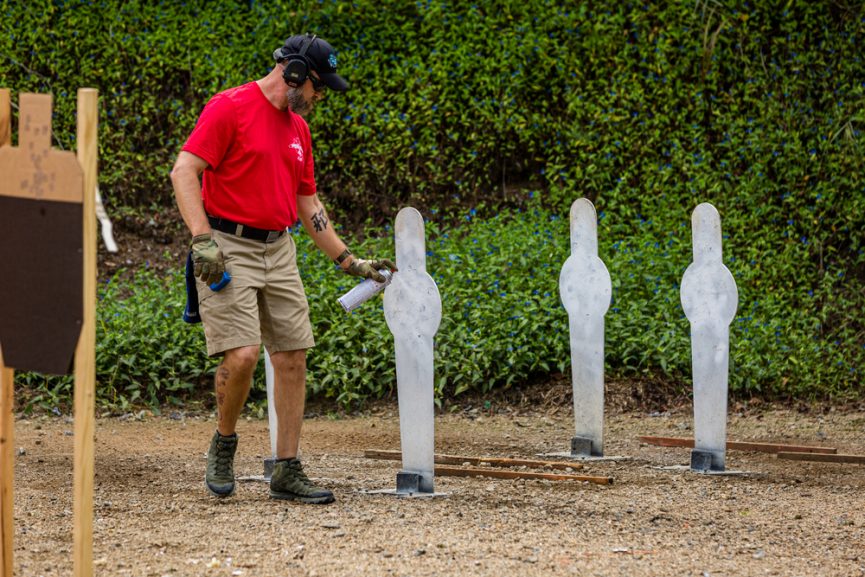When you pay your match fee for a Level 2 or above match, what are you actually buying? Debugged stages? Consistent staff for every stage? More competition? Trophies?
I submit that it is also entirely reasonable for big matches to have staff do all the pasting and reset for you, leaving you to just worry about refilling your mags and visualizing your stage plans.
As a rule of thumb, short courses should have at least two people, medium courses at least three people, and long courses at least four people working the stage, including the timer and tablet RO. That way, when the shooter has completed the course of fire, the timer RO walks through the stage, calling out scores to the tablet RO. When they’ve scored the last target, the tablet RO goes off to get the shooter’s approval on the score, and if necessary copy the score to a paper backup.
(Both the 2019 and 2020 NC matches used carbon backups, and I found on my stage that it’s faster to just have the tablet RO copy it over on their own. Calling out the scores to a second person who writes them down seems like it would be faster, but in practice just isn’t. Instead, it just makes work for two people instead of one.)
While the tablet RO chases down the shooter and gets their sign-off, the timer RO then turns around and starts pasting back toward where the scoring started. The additional staff each have an assigned place to start pasting, and everyone works to paste their section of the stage. The timer RO is the last person to come uprange. As soon as they are uprange of the start position, they can start the next shooter with a crisp “Make ready.” (But what if the next shooter isn’t there? Trust me, if the competitors don’t have any job to be doing except shooting, they’ll be there.)
So that’s how it works. Let’s go through the benefits, starting with the match staff.
At the scale of a match, having staff reset will deliver the minimum shooter-to-shooter time any day of the week. Staff are faster to reset, with fewer people, because there is no question who is pasting which target. Staff aren’t worried about getting paint on their hands while resetting steel. Staff can have specific tools like paster guns that speed up the process. Staff are there for one job, and don’t need to conserve their energy for later stages of the day.
With staff pasting and resetting, you eliminate reshoots due to unpasted targets. You can trust that the hard cover got painted after each shooter (because it was one person’s job, verified by the timer RO), so you can quickly and accurately judge if a hit was full or partial diameter.
You also eliminate an entire class of cheating where the shooter clips a no-shoot and his buddy prematurely pastes a target on the other side of the stage, which forces the match staff to issue a reshoot. If the staff is resetting, the only non-staff downrange of the shooting area should be the competitor or their delegate, and you can watch the one or two of them more easily than a half-dozen competitors. (Having the staff wearing matching shirts helps too. See “Staff Package” below.)
Okay so this all sounds great. What’s the catch? Nothing in life is free. What does it cost to make this happen?
The first part of making staff reset work is that you have to take care of your staff. You have to recruit and retain quality, by-the-book, hardworking ROs. You don’t just post a Google Form somewhere and anyone that can fog a mirror gets a free match and a t-shirt. You reach out to people you’ve worked with before. In short, you don’t just wait for it to happen, you make it happen.
You also actually have to take care of them. Communicate with your staff clearly via email so folks know when to be where and what to bring. Have some prizes set aside for your staff, do not just let them pick over whatever’s left on the prize table Sunday evening. Feed them good meals. Don’t take them for granted. This cannot be faked. If a match treats you as an interchangeable cog, you feel it and you don’t sign up to work the next year.
The second part is money. You need to have a budget for your match that includes paying for however many staff you need. Ball-park it at your number of stages plus one for chrono plus one for error times 4 ROs. Include not just the match fees but the entire staff package. Budget for your other costs like consumables for the match and so on. Then set the match fee high enough to cover it. The NC Section this year cost $140 and managed to break even with the match about two thirds full.
If your match fee is higher than other matches around you, people will complain. But you are providing a higher quality product and the people that want to buy it are willing to pay. It might take a few years for the word to get out, but the competitors who are really invested in the sport and want to shoot at their absolute peak will be lining up to shoot a full-staff reset match.
Staff Package
Here’s what the 2019 and 2020 NC Section staff package was: firstly, the standard free match fee and staff shirt (same design as the match shirt, but a distinct color not available to the public making it easy to spot staff during the match). Also new in 2020, each staff member got a coozie and an insulated tumbler with the match logo and “Staff” on it, as a practical thank-you.
Additionally, staff got $150 for travel and lodging, with an additional $100 if they lived more than 50 miles from the range (and would presumably be staying in a hotel).
There was the usual group rate at the hotel.
There was the equal shot at the prize table, as mentioned previously.
There was boxed lunch on the range for the ROs. Your stage didn’t have to send one person to the buffet line to get a plate for everyone. As the staff, the lunch comes to you, on a golf cart or in the trunk of a car. It’s hard to overstate how important this is. The way to your staff’s heart is through their stomachs. There is something surprisingly effecting about someone looking out for you and making sure you’re fed. Again, take care of your staff, and mean it.

